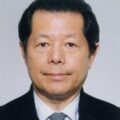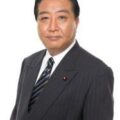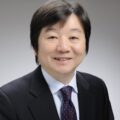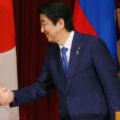Predictions for 2015 Can the Nation (N) Fill the Gap between Global (G) and Local (L)?
In 2014, it was The Empire Strikes Back, but will it be Return of the Jedi in 2015?
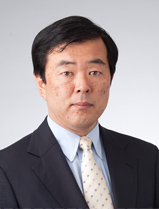
YOSHIZAKI Tatsuhiko, Economist
Yoshizaki: It is my impression that 2014 was a dull year without any kind of theme. Even though it was an Olympic year and a World Cup year, there were no cool buzzwords. Compared to 2013 when we had a lot of snappy phrases like “je-je-je” (an expression of excitement) or “baigaeshi” (double revenge), 2014 was a lean year when it seemed that the only words on everyone’s lips were “Dame yo, dame dame” (No, you mustn’t, no, no). I wonder what 2015 will be like.
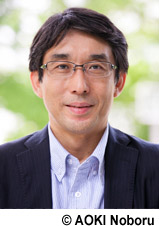
SAKURA Osamu, Researcher (Science, Technology and Society)
Sakura: My impressions are similar. It was a year when the future seemed uncertain. So far, we have more or less had some idea of what will happen next, but now we don’t know. It doesn’t apply to my area of expertise, but in politics, there is no one else to pick up the pieces if the LDP fails. As far as the economy is concerned, the Bank of Japan continues to expand monetary easing, but a sense of stalemate is settling in because anytime now, the bank will have no more cards to play. This is not a story that is unique to Japan, the same thing is happening in the United States, in China, and all over the rest of the world. It is my impression that the lack of vigor in the economy is also reflected in the field of science and technology. One way or another, I would like to see a recovery.
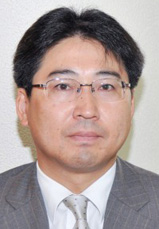
KAWASHIMA Shin, Researcher (Chinese Diplomacy)
Kawashima: Thirty years from now, when we look back at 2014 and consider what kind of year it was, I think we will notice several features typical of a transition phase. For example, the changes in the security guarantee framework. 2014 was the year when Japan and Australia drew closer together and when the security guarantee framework for East Asia and the Western Pacific, including the security arrangements between Japan and the United States, started to change. From the perspective of international politics, it was the year when China clearly changed course and headed in a more aggressive direction. I have the impression that people will say that something changed in the period from 2014 to 2015.
Yoshizaki: At first, when the second Abe administration was formed, people were saying that we would have three years of a golden age with no national elections before the upper house election in the summer of 2016. In that sense, the situation is a perfect fit with the Star Wars trilogy. In 2013, we had “A New Hope” and in 2014, we had “The Empire Strikes Back,” which suggest that we will see “Return of the Jedi” in 2015 [laughter]. I am not sure how Abe will bring the Jedi back to life, but I agree that 2014 was an uneventful year sandwiched between 2013 and 2015. The general election at the end of the year looked like a spot check to me, rather than something for the greater good. Winning meant he did well, losing would have meant he did something stupid. I think it was a gamble typical of Abe. However, the bottom line is that he was never going to suffer a major defeat.
Kawashima: In 2014, there were too many instances where no consensus was reached. From the viewpoint of the trade balance, everyone knows that it would be best to restart the nuclear power plants, but we have to consider the safety issues. If we are honest about the right to collective defense, we know that Japan has this right, but that doesn’t mean that there are no rules around using it. I think there was a lot of conflict between theoretical principles and more practical areas. Even though everyone knows the general framework, it was not possible to reach consensus in practical areas. That is why we had a lot of eleventh-hour battles. On the history issue, the Kono Statement and the Murayama Statement are still with us, but… I think the conclusion to this “but” will emerge in 2015. There is also the right to collective defense, but… here as well, I think 2015 will clarify what is on the other side of this “but.”
Yoshizaki: A moment ago I referred to The Empire Strikes Back in the context of 2014, but what is the “Empire” if not the wall that is blocking the path beyond the “but” that Professor Kawashima mentioned. Even though the general framework has been decided, we find ourselves unable to take the final decisive step. I wonder if we will be able to break through this wall in 2015?
Sakura: The public responses to scientific and technical risk is typical of the lack of consensus. Seen in a good light, the Abe administration is able to make decisions, but in a bad light, it is a top-down authoritarian government. Even though the general framework is decided at the national level, the authorities clash with local communities when they try to implement it. Perhaps it is difficult to reach a consensus because more and more people have their say on the Internet. These days, real-life demonstrations are also emerging from the Internet. This is not a bad thing in itself because it suggests that society has matured. But, if we take it one step further and consider the overall picture, we will never reach social consensus unless we set aside minor differences to accomplish the greater good. I have a feeling that this is at the root of the nuclear power issue and several other problems.
Kawashima: I couldn’t agree more. Since 3/11 more people have been speaking up against the government and we have an atmosphere where people do things on their own initiative. A lot of people use social networking services to participate in discussions. As a result, the cost of aggregating and consolidating opinions has increased. It is extremely difficult for politicians and other people who are in a position to set the ball rolling to ignore public opinion and take action. However, you lose sigh of consistent action if you only look to public opinion. From the perspective of the government, the burden of accountability is now heavier. However, if you look at public opinion on the Internet, a great deal of the discussion is not based on fact, so I think that the issue for 2015 will be to explain basic information and facts to people and to form a consensus on this basis.
The year is a veritable minefield of historical issues
Yoshizaki: After watching the Abe administration over a period of two years, I have realized that Abe is a pragmatist where foreign diplomacy and security are concerned, but a risk-taker where economic policy is concerned. The prime example being to nominate Kuroda Haruhiko as the governor of the Bank of Japan. The expansion of monetary easing has also laid bare his radical nature. Then there was the bid for the Olympics. Since the bid was successful, it was a good move, but had it failed, he would have been in choppy waters. Abe is somebody who gambles. Fortunately, he hit the jackpot in these two instances, but he lost some of his gambles in the second year in office. Two female cabinet ministers were forced to resign and he was unable to pass the bill to legalize casinos.
I think the expansion of monetary easing is also a tremendous gamble. I only noticed it after the fact, but the next Bank of Japan Monetary Policy Meeting after the meeting on October 31, was on November 18. In other words, if you expand monetary easing the day after November 17 when the figures for GDP in the July to September quarter were released, deflation is somehow swept away. Implementing it on Halloween was also deliberate. It was timed to come immediately after the United States ended its third round of quantitative easing (QE3), so seen in an international context, there was no better timing than this. On the domestic front, there is the problem of the consumption tax. If the decision to postpone the tax had come first, it would have been extremely difficult for the Bank of Japan to decide to buy up large quantities of national debt when tax revenues are falling. But I don’t think monetary policy requires “fine play,” and if Governor Kuroda does something like this, the negative aspects of the recognition by the markets may gradually emerge in the future. The expansion of monetary easing was adopted by a slim margin of five votes to four at the Monetary Policy Meeting, but two of the members are deputy governors, which means that three of the policy board members, including the governor, are thick as thieves. That means that only two of the other six members on the policy board agreed. So, in actual fact, it was carried by a vote of two to four. As an economist, I hope this gamble ends well, but if I were one of the people involved, I would have opposed it for being a part of the “Empire.” [Laughs]
Kawashima: The Abe administration also took a bold approach to foreign diplomacy in 2013 and 2014. They tried to branch out more than in the past by building relations with Australia and India. There was a sharp drop in investment in China, but by streaming the investment to the ASEAN instead, expectations on Japan in southeast Asia have risen to such an extent that the United States is jealous. I think relations between Japan and the United States are also recovering from the so-called Hatoyama shock. Be that as it may, I am not sure to what extent foreign policy can compensate for the severe state of the economy. There are no breakthrough solutions, not even TPP, in sight. Since there were no grand designs, it was not long before the discussions were trivialized in a context of “opposition to China.” Foreign policy requires grand orientations and looking ten or twenty years into the future.
In 2015, we will mark seventy years since the end of the war. It is a critical juncture and a “defensive year” when we will focus on preventing blunders involving historical issues. Historians dread any year that ends in a five because we get abused when we attend international conferences [laughs]. In August, Korea will celebrate independence from Japan on National Liberation Day. In September, China and Russia will probably celebrate the seventieth anniversary of the victory over German fascism and Japanese imperialism. In December, there is the Nanking Massacre. It will also be one hundred years since Japan issued China with the Twenty-One Demands during the First World War, and 120 years since the end of the First Sino-Japanese War. Japan will be criticized over historical issues during this year. There is also the possibility that the textbook authorization and the content of the Abe statement will invite a flood of commentary. I think it will be necessary to orchestrate a symbolic reconciliation with the United States, Australia and other Western countries to weather 2015. Prime Minister Abe striking a reconciliatory pose in a form that the world’s media can easily understand in a place like Hawaii, Australia or Southeast Asia, where feelings toward Japan are not so bad, will probably serve to raise the international profile of Japan.
A return to a government that cannot decide?
Sakura: The Abe administration is swimming against the international tide on the issue of decision-making vis-à-vis risk. In Europe and the United States, it is not possible for society or the state to make any decision where science and technology are involved without public participation. I am not talking about the merits or demerits of this standard, only that no decisions can be made unless you do it this way. Consensus is reached by organizing some form of town meeting. This in itself has become a topic of research and the knowhow is accumulating. In Japan, the Democratic Party of Japan (DPJ) administrations were exploring similar approaches, but the Abe administration has turned its back on the global standard and taken a top-down approach dominated by bureaucrats. Some people may well think it is a good thing because the decision-making process is quick, but this way of doing things does not hold up from a long-term perspective. If you unilaterally impose decisions taken by bureaucrats no matter what, people will explode with dissatisfaction at some point. There is no budging policy unless you have a format where everyone participates in the decisions through a process of discussion. I think one of the focus points of 2015 will be whether the Abe administration is able to revise the one-sided top-down politics of the past.
Yoshizaki: I know that decision-making with public participation is the global standard, but on the other hand, is there not a danger that we might return to a government that cannot make decisions? I think that the debate about energy that the DPJ conducted with public participation was, in the end, only evasive maneuvering because they did not have the guts to make a decision and it would allow them to say that the decisions were taken jointly. Asking what people think the ratio of nuclear power should be in 2025 is similar to asking them what they think their salary should be in twenty years time. Everyone will give a similar answer, won’t they? Rather, it seems that the government officials no longer have the guts to tell people that sometimes the state has to do something bad for the good of the nation.
Kawashima: What Professor Sakura just said is very important. We live in an age when the government has to explain and persuade its citizens and depending on the issues, it needs to delegate authority to local government. In the West, the public has accumulated experience and knowhow of participation in the political process, but in the case of Japan, we cannot say that it is sufficient. As Mr. Yoshizaki says, there is also a risk of inviting even more confusion. How can we implement a healthy politics with public participation in the long term? If there was agreement on the national image at some fundamental level, it could work twenty to thirty years into the future, but at the moment, liberal and macho attitudes are extremely polarized in politics and it is not possible to build any consensus.
Sakura: It is not possible to have one hundred percent agreement when you try to make decisions. The ultimate decision-makers are always the ones to be pelted with rocks. It is the job of the government to take the ultimate responsibility after drawing out the opinions of the citizens during the process stage. If they back away, chaos descends.
Kawashima: University administration is a typical example. The Ministry of Education, Culture, Sports, Science and Technology (MEXT) takes no responsibility, the risk is all with the universities and they pass it on to us. It’s terrible. [Laughs]
Sakura: I agree with you. We had the uproar over STAP cells and in August MEXT issued new guidelines about fraud and misconduct in research, but in the end, they just said that if the university does something bad, there won’t be any funding and thrust all responsibility on the university. It’s a wholesale delegation of responsibility in an area where the state should be showing the way. Ultimately, I get the feeling that it is all arrogance over money.
Kawashima: Politics should be about redistributing wealth after building consensus, so the consensus-building process is important from the start. Politics end when you skimp on the cost of building consensus and then suddenly use the redistribution of wealth to wield power.
What happened to active roles for women?
Yoshizaki: In 2014, the Abe administration came up with two new slogans. One of them was active roles for women and the other one was to revitalize local economies.
The question of the participation of women in the workplace is not an idealistic argument, but a pressing necessity. The male to female ratio in the workplace is already 56 to 44. The number of male workers peaked in 2007 and demographics suggest the numbers will not increase further. But for female workers, there is still a lot of room to grow. We are already in an age when corporations can no longer say that they prefer male workers. Naturally, there needs to be support for childcare to get women into the workforce. I am not sure about the level of Abe’s commitment, but when you talk to women, most of them don’t believe him. They say it’s a publicity stunt. The reaction is that he is using expressions like “active roles for women” instead of gender equality because he does not recognize the rights of women, but he is happy to use them in the workforce.
Kawashima: The phrase “active roles for women” is not popular with women themselves. [Laughs]
Yoshizaki: When you talk about gender equality, the discourse turns to a system of women retaining their own family names after marriage, and neither Abe nor the LDP are in favor of that. However, realistically speaking, unless women start to rapidly enter the workforce, including the blue-collar jobs, corporate activity will grind to a halt. Women’s participation in the workforce is a theme for the long run.
Kawashima: Originally, the political agenda on women was set in the context of gender discourse, but somehow this has been sidestepped by the discussion about growth strategies. I think that “active roles for women” is a problematic manner of speech. It lumps all women together, but feelings about work are totally different depending on the generation, the region, and the circumstances that women find themselves in. Such detailed texture hardly gets a look-in at all. You can create all the systems you want, but I have a hunch it won’t work because of this.
Yoshizaki: Systems are for the most part built out of customs and habits that are not written down anywhere. The world doesn’t change just because you create laws. Decisions are based on us being vaguely aware of something. Just like the arrangement of the letters of “QWERTY” on the keyboard for a personal computer, there is no rational reason, but things don’t change because once decisions are made, we become reliant on them. I think the whole outlook will change one day when we start wondering why this kind of absurdity went on for so long.
Sakura: The participation of women in the workforce may well change once people take notice, but I am afraid that where the regions are concerned, it was already too late by the time anyone noticed.
Revitalizing local economies? Focus on the local (L)!
Yoshizaki: In that context, we must not overlook Masuda Hiroya’s study about the extinction of the regions, Chiho shometsu, or the concepts presented in Toyama Kazuhiko’s book about the global and the local spheres, G no sekai, L no sekai. These books attack the blind spot in the economic policies of the past. Up to the present, we have only talked about the global (G) sphere and we have ignored the local (L) one. But, which one is bigger in terms of scale for the Japanese economy? For both GDP and employment, it is the local sphere. Even so, Sony and Toyota are forever saying this and that about the global sphere alone. I agree with the suggestion that it is, in actual fact, more important whether or not a bus company in Tohoku survives into the future. We will have to shift our attention to the local sphere if we are to continue to talk about the economy.
Sakura: Nichia Chemical Corporation where Professor Nakamura Shuji started his work on blue LED is based in Tokushima. It seems to me that it is a sign of the strength of knowledge dissemination in Japanese corporations when someone is awarded the Nobel prize for achievements that began when he was an employee at a local company. If everything is concentrated in Tokyo or the Kyoto-Osaka-Kobe corridor, and the regions are downgraded to subcontractors, the potential power of innovation coming out of the regions will be lost.
Kawashima: If we only look at the global sphere, we will end up whittling down the strength of the country as a whole.
Sakura: It’s because looking that way seems more efficient at first glance.
Yoshizaki: If you give a speech in regional areas, people are not at all receptive to talk about the global sphere, or this and that about growth strategies. “Is that what people in Tokyo are talking about these days?” is the type of cool reaction you get. So far, the Industrial Competitiveness Council and the Council on Economic and Fiscal Policy have labored under the misapprehension that the Japanese economy will improve when they develop strategies, but in actual fact they should look to the regions and the factory floors.
Professor Toyama says that corporations have to withdraw to a certain extent because there is an oversupply in the local sphere, but when they do that, other mistakes are made, such as saving companies with a good balance sheet and crushing companies with a good profit/loss statement. The criteria for judgment is whether or not a company has good assets, rather than whether or not it is profitable. If a company has good assets, it may only be a matter of a lucky inheritance from earlier generations. Banks have to lend money to companies who have good managers and real prospects for the future.
Kawashima: Even though globalization is by rights supposed to strengthen the local sphere, in Asia, it is only the states and the capital cities that grow stronger while the local sphere is crushed. This is different than globalization in Europe and North America. The indications are also that it is only the wealthy in Asia who benefit from globalization.
Yoshizaki: Tokyo, Beijing, Seoul, Jakarta, Bangkok… Asia is full of cities with an excess concentration of people and industry.
Kawashima: In Europe, globalization means a direct link between the local sphere and the wider world. The nation (N) sits between the global and the local spheres, but the nation and the local sphere must be well-balanced. Situations where a nation controls a local area in the name of globalization are changing. If there is perfect balance between the nation and the local sphere, the local sphere will have access to the global sphere and the regions will rise to prominence. In actual fact, the EU has weakened the power of the nations. This means that the relationship between the global and local spheres will change depending on the strength of the nation.
Sakura: So, to eliminate the overconcentration of people and industry, we have to revise the role of the nation and the regions must connect to the wider world.
Positioning the nation anew is the biggest challenge
Kawashima: Revising the role of the nation at this time of dysfunctional democracies in East Asia will be a major challenge for 2015. In Taiwan, Hong Kong and Thailand, public opinion as expressed in the elections has diverged from current public opinion. However, the next round of elections is several years away. There has also been an increase in the segment of the population who do not accept or consent to the decisions made by majority rule. This is also related to domestic polarization, and since there is not much that can be done about it, the result is that we end up with political chaos. How will Japan respond to this problem? Ironically, I have been told that Japan is lucky because we get a new prime minister every year [laughs]. That’s the extent of the democratic drift in the world.
Yoshizaki: It is an extremely difficult problem. The United States just had its midterm elections. The reaction on the market was that the government has been unable to make any decisions, but in the meantime, the employment figures have improved, the share prices have risen and fiscal revenue has also improved. So, they don’t need the government because they keep making money in the economy while the government is deadlocked over decisions. There’s an atmosphere of apathy. But even if the economy is doing well, foreign policy is in trouble when nobody can make decisions.
Sakura: In the field of science and technology, there are worries about the confusion around the position of the nation state in cyberspace. There are serious problems with cyber terror worldwide, but nobody knows what kind of framework to pit against it. From the perspective of the nation state framework, a lot of the things that happen make no sense. Bitcoins bypass the framework of the nation state. Another major cross-border issue is dual-use for civilian and military purposes. Technologies that were developed for civilian applications are used for military purposes by terrorists at the export destination. How do we prevent this? When a couple of Japanese researchers submitted an article to Nature magazine about their work on the bird flu virus in 2011, they were stopped from publishing the article on the pretext that the research could be used for biological warfare. Since the content was really basic research, it was published at a later stage, but this incident forced Japan to create standards for these types of problems. But nobody had any good ideas about what kinds of standards to create, or how to apply them. Up to now, the state has been responsible for the governance of science and technology, but now it no longer functions effectively.
Kawashima: It’s no longer possible to gain peace of mind by creating institutions and systems on a national scale. In a sense, the only option is to reduce the size of the building blocks of society. When society diversifies to this point, the one size fits all approach to the mass is no longer possible. You have to let people decide for themselves. The nation state cannot deal with all of it. We have to look after ourselves and learn to make the best possible use of national systems. If Japan were able to emulate the European example and show the world that it can build a decision-making system with public participation, we would earn our place among the mature nations.
Sakura: The Meiji restoration of 2015, you mean?
Kawashima: That’s right. We could include measures to deal with the aged society and more. Because that’s an issue that all countries in Asia will be struggling with in the future. If we were able to successfully point out ways to restore public participation in a democracy while lowering the cost to the nation, I think we would make our presence felt in the world even if our GDP drops. Despite this, it seems that current politics in Japan is heading in a macho direction, which is the polar opposite.
Sakura: The new positioning of the nation between the global and the local is not going well. In 2015, we have to start differentiating between the local, the national and the global building blocks, and decide when to use which approach.
Kawashima: Aside from “glocal,” the nation is also important. Perhaps Japan would be able to create a model for a structure that deals with issues at the local, national and global levels, or possibly an even more multilayered structure.
Yoshizaki: The structure has to be both multi-layered and deep because once the first wall is breached, we will come up against the next one.
Kawashima: 3/11 is a good example because we understand that it is impossible for the nation to deal with this problem on its own.
Sakura: It was all over when the nation’s only wall was breached.
Kawashima: Crisis management was up to the people on the ground. There was no choice but to use the local resources. I think it would be great if Japan used this experience to rebuild a multilayered framework for politics and society. I hope we will see signs of this in 2015.
Translated from “Tokushu: 2015 nen wo yomu — Zadankai: Gurobaru (G) to rokaru (L) no aida wo kokka (N) wa umerareruka / “Jihyo 2014” shippitsujin ga yososuru (Special Issue: Predictions for 2015: Round-table talk: Can the nation (N) fill the gap between global (G) and local (L)? / Predictions by writers of Commentary on 2014 in Chuokoron),” Chuokoron, January 2015, pp. 68–77. (Courtesy of Chuo Koron Shinsha) [January 2015]
